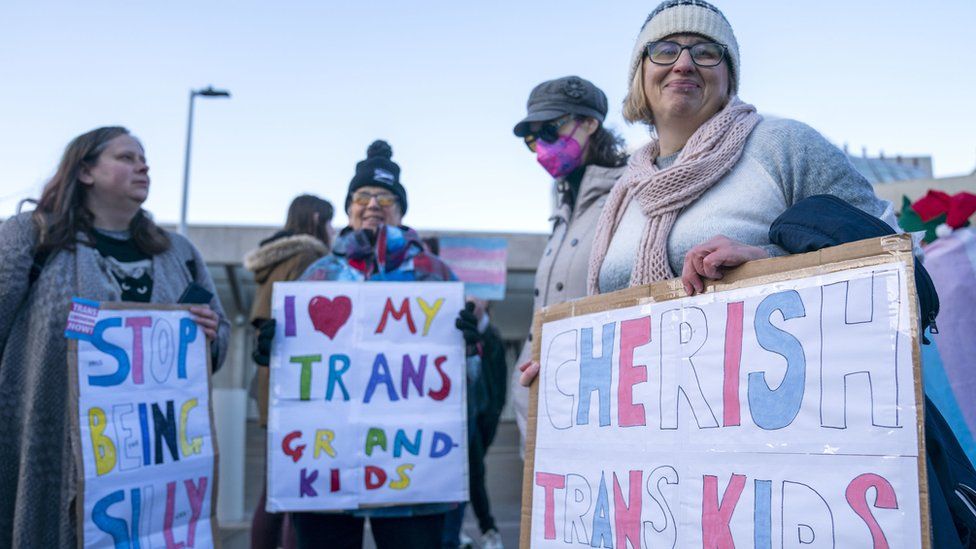ARTICLE AD BOX
 Image source, PA Media
Image source, PA Media
The reforms would allow people to change their legally-recognised gender from the age of 16
Blocking plans to make it easier for people in Scotland to change gender have been branded "draconian" by the country's social justice minister.
Shona Robison said the move was a "dark day for democracy" in the UK.
And she dismissed suggestions that the reforms would impact on UK-wide equalities laws.
The UK government is to formally prevent the reforms from gaining royal assent later on Tuesday.
Scottish Secretary Alister Jack has said the reforms would have a "chilling effect" on things like single-sex spaces and rules on equal pay for men and women, and that having different processes for changing gender across the UK would create "significant complications".
He will use a Section 35 order to prevent the Gender Recognition Reform (Scotland) Bill from gaining royal assent - the first time the mechanism has been used since the Scottish Parliament was created in 1999.
A Section 35 order allows the Scottish Secretary to block legislation passed by Holyrood if he believes it would have a detrimental impact on areas that are reserved to Westminster.
Speaking to the BBC's Good Morning Scotland programme, Ms Robison described the move as "outrageous" and said it would "cut across Scotland's democracy".
She added: "I think it is a dark day for democracy in the UK and I think people should be very concerned that this is the thin edge of the wedge for future legislation."
Ms Robison said the Scottish government was "very, very confident" that the legislation was competent and did not impact on UK laws, and pledged to take "whatever steps we need to ensure that the democratic will of the Scottish parliament is not frustrated".
She accused the UK government of "using one of the most marginalised groups in society as a political weapon".
Image source, Scottish Parliament
Image caption,Ms Robison said the Scottish government would do whatever it takes to ensure the reforms become law
The minister added: "This is just the latest in a string of increasingly draconian behaviour from the UK Tory government.
"I think there are ministers within the Sunak government who are very bullish about this and who want to roll back on human rights and equalities legislation, and it is also about the Secretary of State for Scotland wanting to throw his weight about."
She said she believed the decision to block the reforms had not been the unanimous position of UK ministers and that "the shrill voices within the UK government who want to undermine Scotland's democracy and want to rein back on people's rights have won out, and we will not stand for it".
Gillian Keegan, the UK government's education secretary, said she was surprised by criticism of the move to block the gender reforms.
Ms Keegan said the UK could not have "competing" gender and equality legislation, and that the Scotland Act which created the Scottish Parliament had included the Section 35 provision "for exactly this type of scenario".
She told BBC Breakfast: "The Secretary of State for Scotland has used this power because we can't have two competing gender and equality legislations.
"So we need to look at that and need to work out what to do, and he'll be setting out and making a statement later on today in parliament."
What are the gender reforms?
Image source, PA Media
Image caption,Opponents of the reforms are concerned about their potential impact on legal protections for women
The Gender Recognition Bill was passed by 86 votes to 39 in the Scottish Parliament last month, and is intended to streamline the process in Scotland for changing legal gender.
The reforms have been highly controversial, with several SNP backbenchers voting against the bill and Ash Regan quitting as community safety minister in protest.
The bill would lower the age that people can apply for a gender recognition certificate (GRC) - a legal document confirming a gender change - from 18 to 16.
It would also remove the need for a medical diagnosis of gender dysphoria, with applicants only needing to have lived as their acquired gender for three months rather than two years - or six months if they are aged 16 or 17.
Trans campaigners welcomed the reforms, but critics of the plans are worried that allowing anyone to "self-identify" as a woman could impact on women's rights and access to single-sex spaces like refuges and changing rooms.
Scottish Labour, who supported the bill at Holyrood, called on Scottish and UK ministers to find a solution to the impasse.
Shadow Scottish Secretary Ian Murray added: "Trans rights and women's rights should not be used as an excuse for SNP-Tory attrition warfare".

 1 year ago
12
1 year ago
12








 English (US)
English (US)